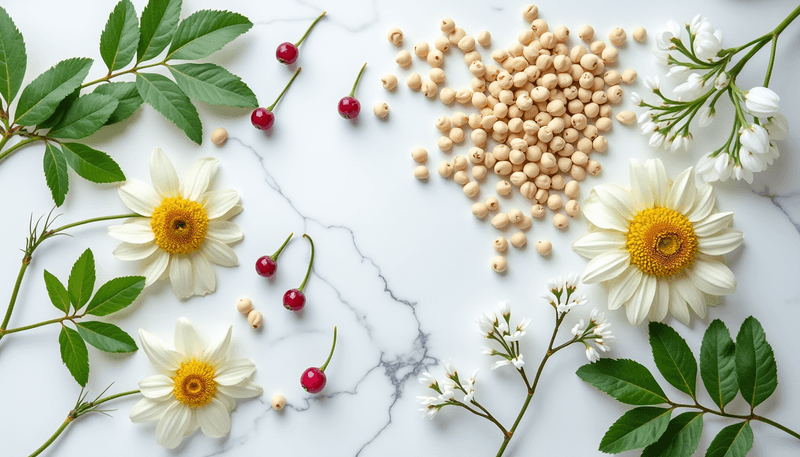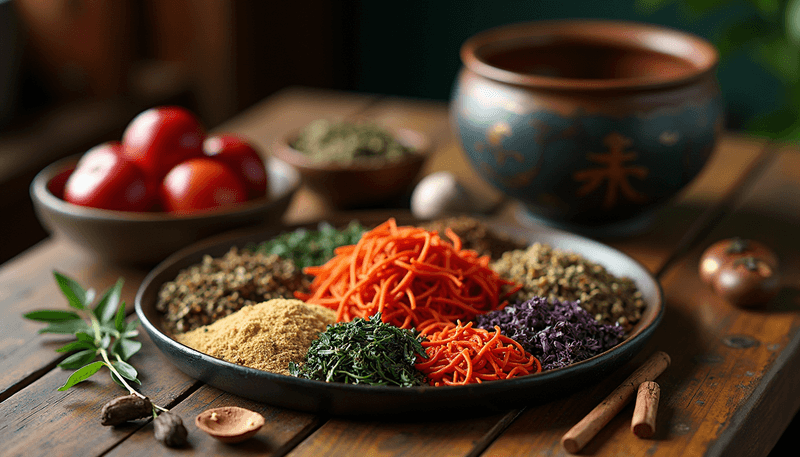Natural Relief for Menopause: What Works?

Let's face it - navigating menopause can feel like riding an emotional and physical rollercoaster. As someone who has personally witnessed both my mother's journey and now counsels women through this transition, I understand the frustration of dealing with hot flashes, mood swings, and skin changes. But here's some encouraging news: recent scientific research has uncovered promising natural alternatives that could help ease this transition.
The Power of Plant-Based Relief
One of the most significant findings from the research is about phytoestrogens - natural compounds found in certain plants that can mimic estrogen in our bodies. Soy isoflavones, in particular, have shown impressive results in reducing both the frequency and intensity of hot flashes.
When our estrogen levels drop during menopause, it's like unplugging a vital power source in our body's temperature regulation system. Think of phytoestrogens as a gentler, natural backup generator - they can help restore some balance without overwhelming the system.
🤔 Have you ever noticed how some cultures with soy-rich diets report fewer menopause symptoms? There might be more to your tofu than just protein!
The Fantastic Four for Skin Health
An exciting breakthrough comes from a study combining four powerful herbs: Glycine max (soybean), Cimicifuga racemosa (black cohosh), Vitex agnus-castus (chasteberry), and Oenothera biennis (evening primrose). This "fantastic four" combination showed remarkable benefits for menopausal skin health and antioxidant status.
Here's how to incorporate these herbs into your daily routine:
- Start your day with soy milk or tofu
- Consider a high-quality supplement containing black cohosh
- Use evening primrose oil topically or as a supplement
- Work with a healthcare provider to find the right chasteberry dosage
💡 Think of these herbs as your skin's natural anti-aging team - each playing a unique role in maintaining your skin's elasticity and glow.
The Sleep and Mood Connection
Perhaps one of the most fascinating discoveries is about purified pollen cytoplasm (PPC). This natural compound has shown promising results in addressing three major menopause concerns: vasomotor symptoms (like hot flashes), mood disturbances, and sleep problems.
Why this matters:
- Better sleep quality leads to improved daytime function
- Mood stability helps maintain relationships and work performance
- Reduced hot flashes mean fewer night-time disruptions
Think of PPC as a natural orchestra conductor, helping to harmonize your body's various systems that may be out of tune during menopause.
Question for reflection: How much is poor sleep affecting your quality of life? Would you be willing to try a natural approach before turning to prescription sleep aids?
The Traditional Chinese Medicine Perspective
A formula called Danggui Buxue Tang (DBT) has demonstrated remarkable effectiveness across three clinical trials. What's particularly interesting is that it works without directly affecting estrogen levels, potentially making it a safer long-term option for many women.
Key benefits of DBT include:
- Improved quality of life scores
- Better emotional wellbeing
- Enhanced physical comfort
- No concerning effects on hormone levels
Conclusion: Embracing Natural Solutions
The research clearly shows that we don't have to suffer through menopause symptoms or rely solely on hormone replacement therapy. Nature has provided us with effective alternatives that can help manage this transition more comfortably.
🌟 Your Action Step: Choose one natural remedy discussed today - whether it's incorporating more soy into your diet or trying an evening primrose supplement - and commit to trying it for 30 days while tracking your symptoms.
Remember, every woman's menopause journey is unique, and what works for one may not work for another. The key is to start slowly, listen to your body, and work with healthcare providers who understand both conventional and natural approaches to menopause management.

Olivia Rose Chen-Martinez
Olivia Rose Chen-Martinez is a seasoned health and wellness writer with a focus on women’s health issues, including PCOS, perimenopause, and holistic wellness. With a background in Journalism and Public Health from UC Berkeley, Olivia draws on over 15 years of writing experience to deliver empathetic, research-backed insights. Her work blends personal anecdotes and actionable advice, resonating with readers seeking accessible and trustworthy information. Based in Austin, Texas, Olivia is also a certified yoga instructor and a dedicated advocate for balanced, integrative approaches to women’s health.







